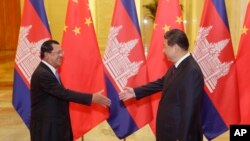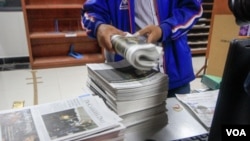Following the arrest of Cambodia’s opposition leader on Sunday and amid a crackdown on critical media and NGOs, China has announced its support for Prime Minister Hun Sen’s regime.
A day after the arrest, Geng Shuang, China’s foreign affairs spokesman, told reporters in Beijing that China “supports the Cambodian government’s efforts to protect national security and stability.”
On Thursday, Wang Jiarui, vice chairman of the National Committee of the Chinese People's Political Consultative Conference, met with Heng Samrin, National Assembly president, and Senate President Say Chhum, officially “offering support” to Hun Sen over the decision to charge Cambodia National Rescue Party President Kem Sokha with espionage.
“China will cooperate and assist Cambodia in all circumstances,” he reportedly said.
Phay Siphan, a government spokesman, said the timing of Wang’s visit was coincidental.
“We thank China since they understand how Cambodia implements the rule of law,” he said. “We think that China understands Khmers clearly, unlike western countries, which use Kem Sokha to bolster their leverage over Cambodia’s leadership,” he said.
The arrest of Kem Sokha, NGOs and media closure drew criticism from the United States, European Union, United Nations, United Kingdom, Germany and Australia, drawing a rebuke from Prak Sokhonn, foreign minister, who scolded the western governments for “interfering” in Cambodian politics, a charge Siphan said did not apply to China.
On Monday, Hun Sen threatened foreign nationals with arrest after claiming that the U.S. and Canadian governments had conspired with Sokha to overthrow the government in a “color revolution”.
Hun Sen, who has been in power for more than 30 years and as a former Khmer Rouge commander knows better than most Cambodia’s history of Khmer-on-Khmer violence, said his regime would not “let foreigners use Cambodians to kill Cambodians anymore.”
Despite the growing anti-western rhetoric, Siphan claimed that U.S.-Cambodia relations remained unchanged. “I want to tell you clearly that [Hun Sen] never sees the U.S. as the enemy,” he said. “But to protect Cambodia’s interests and the people’s wish to see peace as an independent nation ... we have to say, we are not a U.S. puppet.
Sokha’s arrest followed a crackdown on critical media outlets including the forced closure of the influential English-language Cambodia Daily newspaper and several local radio stations that broadcast factual programming in rural Cambodia, where the CPP traditionally draws its support base.
Chheang Vannarith, chairman of the Cambodian Institute for Strategic Studies, said Cambodia was “falling into the trap of superpower politics.”
“What I can say is Cambodian society has embraced democratic values. No force is powerful enough to kill democracy in Cambodia. Cambodia as a small state must strictly pursue [a] neutral foreign policy and no-enemy foreign policy,” he added.
Sophal Ear, an associate professor of diplomacy and world affairs at Occidental College in Los Angeles, said the affairs had shown that China and Cambodia “have each other’s backs,” adding that they were not “brothers in arms”.
“I think U.S.-Cambodian relations are about as bad as they were just prior to the break in diplomatic relations in 1965. Problem is, there’s way more interdependence now and money at stake. Cambodia has more to lose from a bad relationship with the US than the US does with Cambodia,” he added.
Trade between China and Cambodia rose to $4.8 billion last year, up by about $200 million from the year before, while Beijing has now given the government $4.2 billion in grants and loans, according to a speech by Hun Sen in April.
Yong Kimeng of the People’s Center for Development and Peace said he was also concerned that Cambodia would “fall into the trap of superpower countries.”
“China generally does not react over human rights issues, not only in Cambodia but also in other countries in the world,” said Kimeng.
“China sees economic benefits but the western countries want democracy. Only Cambodia itself has to decide wisely in supporting any foreign policy,” he added.









